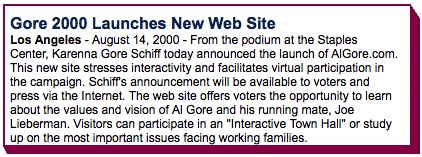 Despite lack of funding, I do my best to keep tabs on what’s going on regarding virtual volunteering: initiatives using the Internet to support and involve volunteers. What I’m particularly interested in are virtual volunteering activities that are new to me, are particularly innovative or particularly successful. I have a series of Google Alerts I use to keep tabs on news stories, press releases and blogs that use certain words and phrases that are good leads on virtual volunteering – remember, most initiatives that involve online volunteers never use the phrase virtual volunteering, and maybe not even the word volunteer. That makes finding stories quite difficult.
Despite lack of funding, I do my best to keep tabs on what’s going on regarding virtual volunteering: initiatives using the Internet to support and involve volunteers. What I’m particularly interested in are virtual volunteering activities that are new to me, are particularly innovative or particularly successful. I have a series of Google Alerts I use to keep tabs on news stories, press releases and blogs that use certain words and phrases that are good leads on virtual volunteering – remember, most initiatives that involve online volunteers never use the phrase virtual volunteering, and maybe not even the word volunteer. That makes finding stories quite difficult.
I keep a list of news regarding virtual volunteering on the Virtual Volunteering Wiki. I did an analysis of this by year and found that 2014 and 2015 were prolific years regarding news related to virtual volunteering, but that after that, the number of stories I’ve found drops each year. Why the drop in stories about virtual volunteering each year for the last five years? I think it’s because there’s not that much that seems newsworthy about virtual volunteering anymore – after all, virtual volunteering is more than 35 years old.
I also use my news searches to update this web page that lists Virtual Volunteering initiatives, to help those looking for online volunteering. While my book with Susan J. Ellis, The Last Virtual Volunteering Guidebook, is focused on helping organizations engage and support volunteers using the Internet, this page is meant to help people that want to be online volunteers. It lists more than 100 places to find virtual volunteering opportunities, and some of the sites I link to, in turn, list dozens, even hundreds, of organizations recruiting online volunteers.
In maintaining this list and in searching for virtual volunteering news, I’ve seen that, in the last five years, there has been a proliferation of opportunities for online volunteers to transcribe scanned historical documents or to tag photos. Examples:
The Old Weather project, where online volunteers transcribe hand-written weather observations made by Royal Navy ships around the time of World War I; using old weather observations can help predict our climate’s future.
Decoding World War I Punchcards, to help tag digitized punch cards that represent soldiers in World War I served by the YMCA, housed at the Kautz Family YMCA Archives, University of Minnesota Libraries. 25,926 men and women are represented by these cards. By digitizing these cards and having them properly tagged, this project seeks to shed light on these individuals and make freely available the biographical and demographic information contained within these cards.
The Freedom on the Move (FOTM) public database project at Cornell University mobilizes online volunteers to add data tags and transcribe scans of newspaper advertisements offering rewards for the capture of fugitive slaves – enslaved Americans seeking freedom and, often, their families. The resulting database will allow users to examine spatial patterns and compare trends over time.
These virtual volunteering transcription and tagging programs used to be few and, therefore, newsworthy. One of the things that made them newsworthy is that they are microvolunteering or microtasks: a volunteer can spend just a few minutes accomplishing something, or spend hours transcribing and tagging. Now, there’s well more than 100 such programs – Zooniverse alone provides links to more than 80 such projects. There’s just nothing really new or innovative anymore about microvolunteering. But it is addictive: I lost a lot of time trying out one of these programs and one project turns into 20 – it’s better than CandyCrush!
What innovation is needed regarding virtual volunteering? A way for online volunteers to participate in these microvolunteering tasks in a way that the time they spend on them and their accomplishments could be automatically tracked, resulting in a report the volunteer could show as he or she wants to: on social media, to a high school administrator who wants to see the number of volunteering hours a student has undertaken or to a probation officer or other officer of the court who wants to see the number of community service hours a person has completed. If some aspiring hackathon or socially-responsible company or whatever wants to create this tool, just give me credit for the inspiration, please?

If you have benefited from this blog or other parts of my web site and would like to support the time that went into researching information, developing material, preparing articles, updating pages, etc. (I receive no funding for this work), here is how you can help.
Also see:
- Microvolunteering is virtual volunteering
- Research needs re: virtual volunteering
- Safety in virtual volunteering
- The future of virtual volunteering? Deeper relationships, higher impact
- How many virtual volunteering projects are there?
- What I learned from researching virtual volunteering in Europe
- Mike Bright, Microvolunteering’s #1 Fan, Has Passed Away
- New report NOT by me re: microvolunteering
- Microvolunteering: beyond the hype
- Crowdsourcing & Microvolunteering: still not new, still takes a lot of work
- Microvolunteering @ Techsoup
- Microvolunteer Idea: Review a Nonprofit

 It’s the FIVE-YEAR anniversary of the publication of my book with Susan Ellis,
It’s the FIVE-YEAR anniversary of the publication of my book with Susan Ellis, 